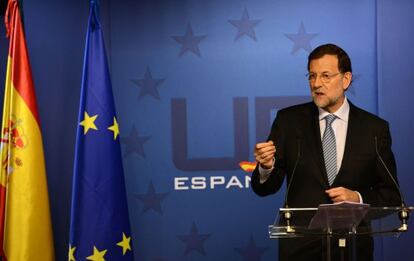Merkel dashes hopes of direct recapitalization for Spanish banks
European bailout funds for lenders will remain on government books Rajoy still undecided on whether to request bailout

German Chancellor Angela Merkel ruled out the possibility of Spain benefitting retroactively from allowing the euro zone’s rescue fund to directly recapitalize banks.
That means that the loan of up to 100 billion euros Spain will receive from its European partners will remain on the government’s books at a time when it is already struggling to tame the budget deficit and put a cap on public debt.
“There will not be any retroactive direct recapitalization,” Merkel told a news conference at the end of a European Union summit in Brussels. “If recapitalization is possible, it will only be possible in the future, so I think that when the banking supervisor is in place we won’t have any more problems with the Spanish banks; at least I hope not.”
The summit agreed to move toward a banking union for the euro zone under the direct supervision of the European Central Bank next year and to eventually allow the European Stability Mechanism (ESM) to directly inject capital into ailing banks. Spain and France had lobbied for quicker implementation of a banking union. Merkel denied delaying the move had anything to do with the German elections next year.
Spain plans to take only 40 billion euros of the loan that has been offered, and Prime Minister Mariano Rajoy downplayed the significance of what must have been another disappointment, saying that the loan was equivalent to four percent of GDP. <CF1000><CP8.8><CS8.8><CL10.5>Rajoy said he had yet to make his mind up on whether to ask for a second bailout to ease Spain’s borrowing costs, and denied he came under pressure to decide at the summit.
“I have to take this decision as head of the government and it hasn’t been taken,” Rajoy told reporters. “If I have to take it, I will take it.”
Rajoy said it was important that the bailout mechanisms exists. The most likely option for Spain would be to seek a precautionary credit line from the ESM, which in turn would trigger the purchase of Spanish sovereign debt in the secondary market by the ECB.
Despite the setbacks at the summit, Rajoy was still upbeat. “A few months back, nobody was talking about either a fiscal or banking union,” he said. “There is willingness in Europe to continue moving toward integration, but things are never easy,” he added.
Asked about the possible easing of Spain’s deficit-reduction program because of the deepening recession, Rajoy said: “Spain has targets and the intention of the government is to achieve them.”
The government plans to reduce the deficit to 6.3 percent of GDP this year and to 4.5 percent the following year before bringing it back within the EU ceiling of 3 percent of GDP in 2014. The IMF has questioned whether the country can meet these targets, predicting that the economy will shrink 1.3 percent next year, compared with the government’s official forecast of a contraction of 0.5 percent.
Tu suscripción se está usando en otro dispositivo
¿Quieres añadir otro usuario a tu suscripción?
Si continúas leyendo en este dispositivo, no se podrá leer en el otro.
FlechaTu suscripción se está usando en otro dispositivo y solo puedes acceder a EL PAÍS desde un dispositivo a la vez.
Si quieres compartir tu cuenta, cambia tu suscripción a la modalidad Premium, así podrás añadir otro usuario. Cada uno accederá con su propia cuenta de email, lo que os permitirá personalizar vuestra experiencia en EL PAÍS.
¿Tienes una suscripción de empresa? Accede aquí para contratar más cuentas.
En el caso de no saber quién está usando tu cuenta, te recomendamos cambiar tu contraseña aquí.
Si decides continuar compartiendo tu cuenta, este mensaje se mostrará en tu dispositivo y en el de la otra persona que está usando tu cuenta de forma indefinida, afectando a tu experiencia de lectura. Puedes consultar aquí los términos y condiciones de la suscripción digital.








































